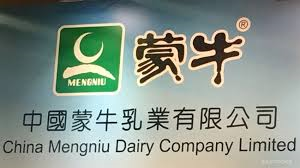As reported by the ABC:
The potential takeover offers a significant 59 per cent premium to the last closing price for Bellamy's shares. Shares closed on September 13 at $8.32, and the offer from Mengniu is $12.65 per share and a $0.60 dividend per share.
The board of Bellamy's has unanimously recommended that shareholders vote in favour of the offer.
Bellamy's CEO Andrew Cohen said Mengniu was an "ideal partner" for the business.
"It offers a strong platform for distribution and success in China, and a foundation for growth in the organic dairy and food industry in Australia," Mr Cohen said.
Mengniu CEO Lu Minfan said the company had growth ambitions for Bellamy's in Australia and the broader Asia-Pacific region, and pointed to investment in the local dairy industry to ensure there was capacity to expand.
Why any Australian baby formula and other dairy product company would require "a strong platform for distribution and success in China" is hard to fathom given this almost daily occurrence in Australian supermarkets:
It is only logical that if Chinese consumers want Australian product that badly, they ought to pay for it. Their concern is with safety, so it seems logical that Australia earmark a given quantity for the China market each year, and ensure that the product is of the highest quality via a system of export labelling.See for example:
The SPS Agreement permits member countries to impose measures to protect human, animal and plant life or health. Furthermore, the Agreement, through its provision for adherence/adoption of Codex standards, which in turn provide for legislative framework for imports and the role for official/government inspection/certification agencies and recognition of such agencies at the exporting country's end through equivalence agreements, permits members to establish formal systems of import control to ensure the appropriate degree of protection for their populace.
Taking strength from these Agreements, developed and developing countries have installed strong import control systems in the food sector. Many of these countries also maintain export inspection systems, but these are very minimal and basically cater for providing sanitary, phytosanitary or health certificates when desired by the importing country.
The need to have a well-developed food quality control system for export is more important for countries that are major exporters. Some of the benefits of such export control systems are highlighted below:
(i)
|
Minimize impediments to trade by reducing the time for inspection and testing at the importing end.
|
(ii)
|
Minimize and even eliminate rejection or non-compliance at the point of import.
|
(iii)
|
Avoid duplication of inspection, sampling and tests at the exporting and importing ends and lead to usage of collective resources more efficiently and effectively.
|
(iv)
|
Are financially more effective as cost of recall, cost of testing at importing end and cost of destruction of consignments is minimized.
|
(v)
|
Take care of variation in quality due to production by small farmers, fishermen or enterprises.
|
(vi)
|
Help in building up the image of the country, as ensures that inferior quality products are not exported by unscrupulous one-time or fly-by-night operators. Such problems can be minimized with mandatory export certification. For example, in the Indian dairy sector, export certification has become mandatory and it is obligatory for exports to take place only from material processed in an approved unit implementing food safety management systems.
|
(vii)
|
Enable official inspection/health certificates to be given as the same are often required by the buyers.
|
(viii)
|
Help in 'Capacity Building' in a country with respect to product as well as systems. With a mandatory export certification system, the country identifies the weaknesses and focuses on correcting these.
|
(ix)
|
Decisions on a country's products that are exported are taken by the country itself rather than by the importing country. For example, if the product does not meet an importing country's requirement, the exporter can, in consultation with the official certifying body send it to a third country, which permits the same, rather than the importing country deciding that it is not fit for consumption as its requirements are not met and therefore needs to be destroyed.
|
(x)
|
Facilitate negotiating Agreements/MoUs for recognition of food control systems and certification by the importing country.
|
(xi)
|
Provide protection to the consumer of the importing country as the broad objective of the exporting country is to ensure that requirements of the importing country are met.
|
(xii)
|
Facilitate implementation of various forms of voluntary certification which address the entire chain from farm to table. This is simplified as a major part of the total chain, namely processing is already covered and only additional areas such as those at farm level need to be certified.
And, it takes an incredibly naive and corrupt administration to be believe that the Bellamy's takeover is not about China securing cheap produce for its huge population: END |


